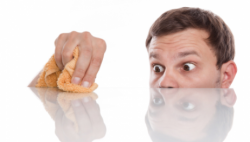Does My Loved One Have Obsessive Compulsive Disorder?
It’s common for people to double check the stove to be sure it’s turned off before leaving the house or to make sure that a door is locked before resorting to bed for the evening, but for those who suffer from Obsessive Compulsive Disorder, the desire to double check things and triple and even quadruple check on things becomes a ritualistic event plagued by obsessive thoughts and feelings of anxiety. Recognizing the signs of OCD early on can help you determine whether a loved one is suffering from more than just a need to check in on things.
Signs of OCD
People who suffer from Obsessive Compulsive Disorder will generally have a range of thoughts and feelings that make it difficult for them to function normally. They obsess over things and become very anxious. The most common signs of obsessive compulsive disorder that you should be aware of include:
- repeat thoughts or imagery that include fear of things like germs, dirt, acts of violence or being hurt
- taking part in ritualistic activities such as repeatedly washing ones hands or locking doors or counting
- feeling anxious about the repeating of the ritualistic behavior, as if there is never a sense of security or pleasure gained from the repeat action
- spending hours each day focused on rituals or on thought processes that interrupt daily routines or the ability to function normally.

Individuals with OCD often have rituals, such as cleaning a surface 3 times, that they feel compelled to complete.
According to the National Institute of Mental Health, “OCD causes distress and (can) get in the way of daily life.” Most people who are suffering from this condition will be compulsive about something in particular or about many different things.
You may catch your loved one counting the number of bites he or she takes at dinner or at each meal, or locking and unlocking the door to be sure that it’s “locked right,” or repeating things over and over again so as not to forget. The individual may be very anxious about being dirty or about germs, repeatedly washing his or her hands or feeling the need to shower excessively or clean the house excessively.
The need to check, touch and repeat or count things is very common in people with OCD. While being safe about a situation or double checking is generally not a compulsion that warrants a need to worry, OCD can lead to complete preoccupation with the way that things “Must” be in order to prevent fear, anxiety or perceived danger and this can interrupt normal routines.
The Diagnosis
If you think that your loved one may be suffering from Obsessive Compulsive Disorder, consider seeking professional help to make a thorough diagnosis of the problem. Many means of behavioral therapy, especially cognitive-behavioral therapy, can be highly effective at helping an individual overcome his or her anxieties and get back on track. Diagnosing the problem is the first step in the overall process of getting help and recovering from OCD.





